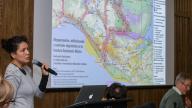The high cost of Canada’s diplomacy on behalf of Canadian mining companies came under public scrutiny during the week of February 5 when the son of murdered Mexican community leader Mariano Abarca and supporters presented a complaint to the Public Sector Integrity Commissioner (PSIC) over the role of the Canadian Embassy in Mexico in the conflict over Blackfire Exploration’s Payback mine in Chicomuselo, Chiapas.
The complaint alleges that the acts and omissions of the Canadian Embassy contributed to putting Mariano Abarca’s life in danger and that the Embassy may not have followed Canadian government policy regarding reporting suspected corruption. This is the first time, to our knowledge, that the failure of a Canadian embassy to follow policy guidelines may be investigated by the Commissioner.
Just prior to presenting the complaint, a group of people from organizations such as Inter Pares, Amnesty International, the International Civil Liberties Monitoring Group, Council of Canadians, the Raging Grannies and others endured -15º Ottawa weather to join the delegation for a commemoration of the life of Mariano Abarca and other murdered human rights defenders in Mexico at the human rights monument on Elgin Street before walking to the Commissioner’s office to present the complaint.
A 2016 report that surveyed criminalization and violence in the context of Canadian mining conflicts in Latin America from 2000-2015 found Mexico to be one of the most dangerous places for land and environment defenders. The same report cited extraordinary violence at Canadian-owned mine sites in states such as Guerrero, where affected communities have been victims of extortion, forced displacement and acts of terror by organized crime and state armed forces, and where communities have denounced the lack of any protection.
During their visit, the delegation participated in numerous meetings with civil society organizations, as well as public events in Toronto, Montreal and Ottawa, and meetings with the Minister of International Trade’s Policy Director and representatives of Global Affairs Canada. The delegation’s visit also attracted considerable media attention.
Speaking to The Globe and Mail, the Trade Minister's director of communications, Joseph Pickerill, stated in an e-mail that "the Government of Canada will co-operate fully," should the Commissioner open an investigation into the case.
The Commissioner has 90 days to analyze the case and decide whether to investigate. Please join us in urging the Commissioner to undertake an investigation as part of the Abarca family’s search for justice for the murder of Mariano – and necessary in order to shed some clarity on Canada’s often-claimed commitment to advance democracy, human rights, the rule of law, and environmental stewardship.
Find an online template to send a letter to the Commissioner and tweet your support at justice4mariano.net.
This delegation was undertaken with support from the United Steelworkers Humanities Fund, Common Frontiers, the Public Service Alliance of Canada Social Justice Fund, the Canadian Union of Public Employees (CUPE), the Council of Canadians, the Committee for Human Rights in Latin America (CDHAL), Inter Pares, KAIROS, the International Civil Liberties Monitoring Group (ICLMG), the Latin America and Caribbean Studies Program at Carleton University, the Mining Injustice Solidarity Network (MISN), Centre International de Solidarité Ouvrière (CISO) and others.










